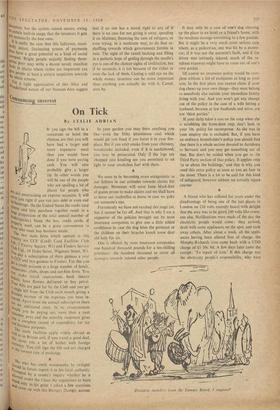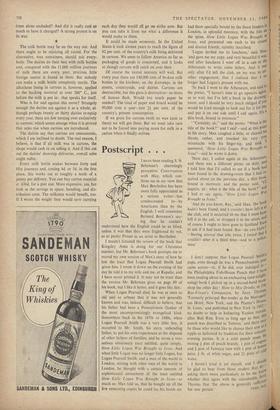-.2 11 stimtng interest
On Tick
By LESLIE ADRIAN
1r you sign the bill in a restaurant or hotel the chances are that you will have had a larger and more expensive meal than you would have done if you were paying cash. You will also probably give a larger tip. In other words you will be one of the people c/- who are spoiling a lot of ate places for people who er nut entertaining on expense accounts. It will sv s0 e You right if you run into debt or creditcard and Ysi -en1 and hire purchase together result in a lar proportion of the total annual number of '"ruptcies.) None the less, credit cards, if hoPerlY used, can be a great convenience to se who must buy business meals.
r
The two main firms which op Ltd erate in this • ot, 1 :nlrY are CCF (Credit Card Facilities Club cit " 7 Fitzroy Square, WI) and Finders Service yoth LW., 10 Duke Street, WigMore Street, WI. tosubscription of three guineas a year • tel‘-k- and two guineas to Finders. For this you res a credit account at a large number of hotels, kuran Es, Cat clubs, shops and car-hire firms. You tiekl make travel reservations, book theatre Your bills have flowers delivered or buy petrol. t bills are paid for by the Club and you get tiel"1111lle bill from the Club each month giving a eu railed account of the expenses you have in- ,red. Apart from the annual subscription there euSilo 110 additional costs. In no circumstances stild You be paying any more than a cash yo°11ier pays and the monthly statement gives a complete record of expenditure for tax and busi The purposes. hl credit facilities apply widely abroad as ill as in Britain and, if you travel a good deal, cur saves you a lot of bother with foreign 41 ".r,len.c. You still of exchange.l sign the bil and are charged e cYurrent rate who has smelt woodsmoke by twilight' pr:uld in future report .it to his local authority. meted b allowed under the Clean Air regulations to burn and° °JAY in his grate I asked a few questions - came up with this H Limply Dumpty answer. in your garden you may burn anything you like—even the filthy bituminous coal which would get you fined if you burnt it in your fire- place. But if you emit smoke from your chimney,' woodsmoke included, even if it is sandalwood, you may be prosecuted. Only if the logs are chopped into kindling are you permitted to set light to your smokeless fuel with them.
We seem to be becoming more antagonistic to our fellows in our attitudes towards claims for damages. Hostesses will soon keep black-lists of guests prone to make claims and we shall have to leave our umbrellas at home in case we poke out someone's eye.
Fortunately we have not reached this stage yet, but it cannot be far off. And that is why I am a supporter of the policies brought out by most insurance companies to give one a little added confidence in case the dog bites the postman or the children on their bicycles knock some dear old lady for six.
One is offered, by most insurance companies, one hundred thousand pounds for a ten-shilling premium : the hundred thousand to cover all damages towards injured other people. It may only be a case of one's dog chewing up the place in an hotel or a friend's home, with the resultant damage amounting to a few pounds.
But it might be a very much more serious case where, as a pedestrian, one was hit by a motor- car; if it was not the motorist's fault, and if the driver was seriously injured, much of the re- sultant expenses might have to come out of one's own pocket.
Of course no insurance policy would be com- plete without a list of exclusions as long as your arm. In the first place you cannot claim if your dog chews up your own things—they must belong to somebody else outside your immediate family living with you. And you won't get any change out of the policy in the case of a wife hitting a husband, because at law husbands and wives are not 'third parties.'
If your daily takes a toss on the soap when she is scrubbing the front-door step, don't look to your 10s. policy for recompense. As she was in your employ she is excluded. But, if you have an ordinary householder's policy you should find that there is a whole section devoted to Accidents to Servants and you may get something out of that. But don't be misled when you get to the Third Party section Of that policy. It applies only 'in or about the buildings,' and that is why you need this extra policy as soon as you set foot in the street. There is a lot to be said for this kind of safeguard, however seldom we actually injure anyone.
A friend who has suffered for years under the disadvantage of being one of the last places in London on 210 volts recently heard with delight that the area was to be given 240 volts like every- one else. Notifications were made of the day the electricity people would come: they arrived, dealt with some appliances on the spot, and took away others. After about a week, all the appli- ances having been altered free of charge, the Morphy-Richards iron came back with a COD charge of £1 10s. 6d. A few days later came the receipt: `To repair of iron.' If this charge was the electricity people's responsibility, why were
'Dissident members from the Tomato Board, I suppose?'
irons alone excluded? And did it really cost so much to have it changed? A strong protest is on its way.
The milk bottle may be on the way out. And there ought to be rejoicing all round. For the alternative, wax containers, should suit every- body. The dairies do their best with milk bottles and, compared with the 11,000 million journeys of milk there are every year, precious little foreign matter is found in them. But nobody can make a milk bottle completely sterile. The alkathene lining in cartons is, however, applied to the backing material at over 200° C., just before the milk is put in: that speaks for itself.
Who is for and against this move? Strangely enough the dairies are against it as a whole; al- though perhaps twenty or thirty dairies re-equip every year, there are few turning over exclusively to cartons; which seems strange when it is proved that sales rise when cartons are introduced.
The dairies say that cartons are uneconomic, which I am inclined to doubt. The real reason, I believe, is that if all milk was in cartons, the shops would cash in on selling it. And if this cut out the dairies' doorstep deliveries, overall sales might suffer.
Every milk bottle makes between forty and fifty journeys and, costing 4d. or 5d. in the first place, this works out at roughly a tenth of a penny per delivery. You can buy carton material at .636d. for a pint size. More expensive, yes, but look at the savings in space, handling, and dis- tribution costs. The milkmen would benefit, too. If I wrote the weight they would save carrying each day they would all go on strike now. But you can take it from me what a difference It would make to them.
It could be made economic. In the United States it took sixteen years to reach the figure of 62 per cent. of the country's milk being delivered in cartons. We seem to follow America so far as packaging of goods is concerned, and it looks as though cartons will catch on over here.
Of course the vested interests will wail. But every year there are 140,000 tons of broken milk bottles in the kitchens, on the doorsteps, in the streets, countryside, and dairies. Cartons are destructible, but this glass is destructive—in terms of human flesh. Would too much paper be needed? The total of paper and board would be 99,000 tons a year—just 21 per cent, of the country's present consumption.
If we press for cartons (with no wax taste to them) we will get them. But we must take care not to be forced into paying more for milk in a carton when it finally arrives.















































 Previous page
Previous page